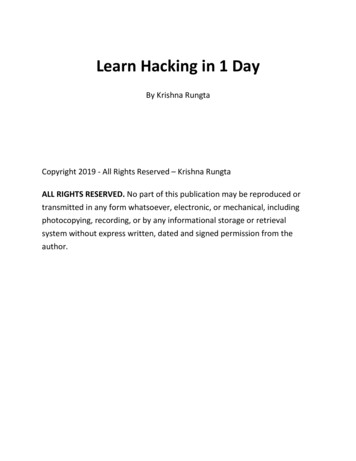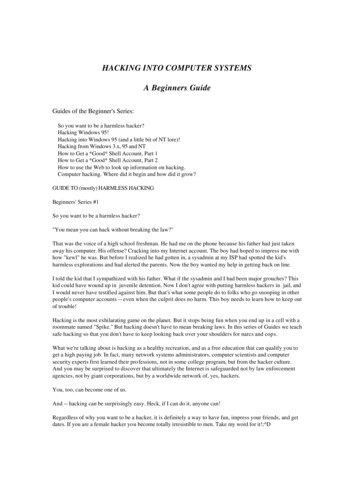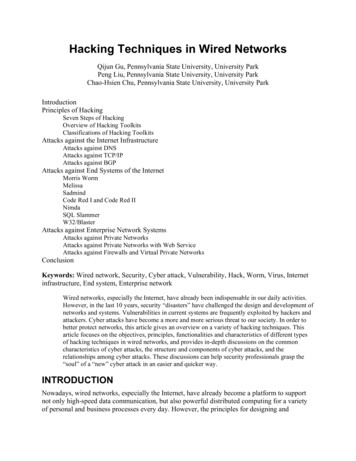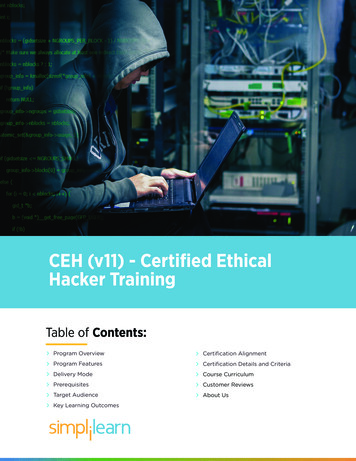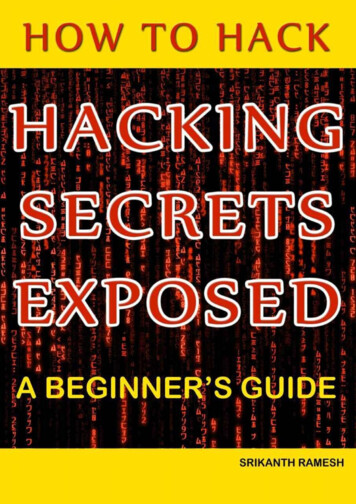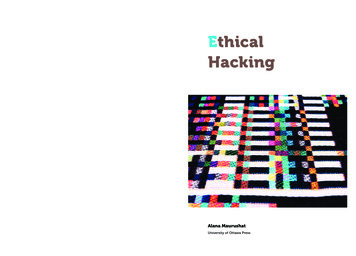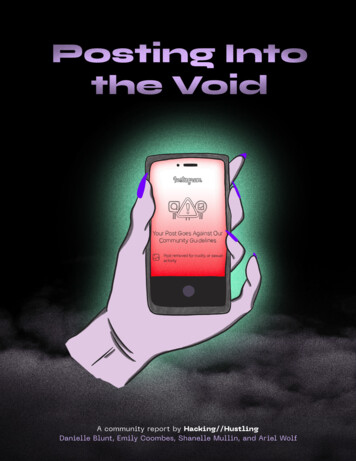
Transcription
A community report by Hacking//HustlingDanielle Blunt, Emily Coombes, Shanelle Mullin, and Ariel Wolf
AbstractAs more sex workers and activists, organizers, and protesters (AOP) moveonline due to COVID-19, the sex working community and organizing effortsare being disrupted through legislative efforts to increase surveillanceand platform liability. Sex worker contributions to movement work areoften erased,1 despite the fact that a significant amount of unpaid activism work (specific to sex work or otherwise) is funded by activists’ directlabor in the sex trades. This research aims to gain a better understandingof the ways that platforms’ responses to Section 2302 carve-outs3 impactcontent moderation, and threaten free speech and human rights for thosewho trade sex and/or work in movement spaces. In this sex worker-ledstudy, Hacking//Hustling used a participatory action research model togather quantitative and qualitative data to study the impact of contentmoderation on sex workers and AOP (n 262) after the uprisings againststate-sanctioned police violence and police murder of Black people. Theresults of our survey indicate that sex workers and AOP have noticedsignificant changes in content moderation tactics aiding in the disruptionof movement work, the flow of capital, and further chilling speech.4 Thenegative impact of content moderation experienced by people who identified as both sex workers and AOP was significantly compounded.Key Words: Sex Work, Prostitution, Content Moderation, Section 230,Tech, Public Health, Platform Policing, Censorship, Community Organizing,Activist, Platform Liability, Free Speech, First Amendment1Roderick, Leonie. What We Owe to the Hidden, Groundbreaking Activism of Sex Workers.Vice, March 2017.2Section 230 is a piece of Internet legislation that reduces liability for platforms moderating content online. FOSTA amended Section 230. Please see the Important Terms andConcepts section for a full definition.3A carve-out may ‘refer to an exception or a clause that contains an exception.’ (thelaw.com)4Chilled speech is when an individual’s speech or conduct is suppressed by fear ofpenalization at the interests of a party in power (e.g. the state, a social media platform orthreat of litigation).2
AboutHacking//Hustling is a collective of sex workers, survivors, andaccomplices working at the intersection of tech and social justice to interrupt state surveillance and violence facilitated by technology. Hacking//Hustling works to redefine technologies to uplift survival strategies thatbuild safety without prisons or policing. It is a space for digital rights advocates, journalists, and allied communities to learn from sex workers. In aneffort to fill in gaps of knowledge the academy and policy makers neglect,we employ feminist data collection strategies and participatory community-based research models to assess the needs of our community. Thiscollective was formed with the belief that sex workers are the experts oftheir own experience, and that an Internet that is safer for sex workers isan Internet that is safer for everyone.Much love, appreciation, and care to our resilient sex working/tradingcommunity for sharing your insights and analysis, your organizing andyour survival strategies. We are grateful to everyone who took the time tocomplete this survey, offered their time and labor for peer review, to JBBrager for their beautiful illustrations, and to our graphic designer, LiviaFoldes, who volunteered her labor and genius. This report was made possible with funding in part from Hacking//Hustling, but largely with fundingfrom our researchers’ direct labor in the sex trades or access to employment in formal economies.3
Author BiosDanielle Blunt (she/her) is a NYC-based Dominatrix, a full-spectrumdoula, and chronically-ill sex worker rights activist. She has her Mastersof Public Health and researches the intersection of public health, sexwork, and equitable access to technology in populations vulnerable tostate and platform policing. Blunt is on the advisory board of BerkmanKlein’s Initiative for a Representative First Amendment (IfRFA) and theSurveillance Technology Oversight Project in NYC. She enjoys redistributing resources from institutions, watching her community thrive, andmaking men cry. DanielleBlunt@protonmail.chAriel Wolf (she/her) is a writer, researcher, and former sex workerfrom New York City. She previously served as the community organizer forthe Red Umbrella Project, a nonprofit organization that amplified the voices of those in the sex trades, and as a research assistant for the Center forCourt Innovation, where she has worked on studies on sex work, humantrafficking, gun violence, and procedural justice. Her first solo academicpaper entitled “Stigma in the Sex Trades” was published in the Journal ofSexuality and Relationship Therapy. ArielHWolf@gmail.comEmily Coombes (they/them) is a scholar-organizer based in LasVegas. Their work investigates the impacts of increasing surveillance andchanging digital landscapes on political mobilization. A PhD student at theUniversity of Nevada, Las Vegas, their research focuses on the 2018 sexworker-led hashtag campaign #LetUsSurvive #SurvivorsAgainstSESTAlaunched against FOSTA/SESTA. Emily previously worked as the NorthAmerican Regional Correspondent to the Global Network of Sex WorkProjects (NSWP) and currently serves as the Resident Movement Scholarfor Hacking//Hustling. coombes@unlv.nevada.eduShanelle Mullin (she/her) is a jill-of-all-trades marketer with a 13year background in growth and tech. By day, she leads conversion rateoptimization at the fastest growing SaaS company in history. By night,she’s a freelance writer in the marketing and tech space. She was recentlynamed one of the world’s top experts on conversion rate optimization. Shestudies web psychology, online user behavior, and human rights in tech.shbmullin@gmail.com4
ContentsIntroduction6Section 230, Free Speech Online,and Social Media Censorship8Methodology27Key Findings301. Sex Workers vs. Activists, Organizers,Protesters (AOPs) vs. Both2. Shadowbanning3. Sex Work and COVID-194. Sex Work and Black Lives Matter5. Chilled Speech6. Organizing Under a Shadowban & Disruptionof Movement Spaces7. Financial Technology8. Catfishing9. Marketing323544474952555761Discussion and Recommendations67Platform RecommendationsPolicy RecommendationsLimitationsFurther Research67686970Conclusion72Important Terms and Concepts74Endnotes835
IntroductionDear Reader,As we look to more censorship, surveillance, and carve-outs to Section 230 (§230) on the horizon, we believe that it is important to understand how thesecarve-outs impact not just social and financial platforms and their content moderation decisions, but the humans who rely on those platforms every day. TheCOVID-19 pandemic, ongoing uprisings against police violence, and the increasingly rapid flow of data between state and private actors highlight how state andplatform policing impacts communities both online and in the streets.Our peer-led landscape analysis of content moderation and changes in online experiences between May 25th and July 10th, during the uprisings against the mostrecent police murders of Black people,1 provides analytical insight to how content moderation systems and amendments to § 230 disrupt freedom of speech—and human rights—in sex workers’ and AOPs’2 digital lives. It is important to notethat algorithms are constantly evolving and being manually updated, but the datain this report mirrors the trends found in our previous study, Erased.The ways that sex work and organizing are policed on the streets through racist,transphobic policing tactics and use of condoms as evidence, parallel the inequitable ways these communities are policed online: content moderation, shadowbanning, and denial of access to financial technologies. While this report beginsto touch on how content moderation practices, deplatforming, and online surveillance can follow people offline, this report just brushes the surface of the extentof how surveillance technology impacts communities vulnerable to policing andin street-based economies.We want to be clear that this is an academic paper, which may not be accessibleto all members of our community.3 While we worked to make this paper as acces-1The current uprisings respond to the systemic murder and assault of Black people by police. Wename and honor George Floyd, Ahmaud Arbery, Breonna Taylor, and Tony McDade, all of whomwere murdered by police in 2020. For just a few of the stories of Black people who have been killedby the police since 2014, see this resource by Al Jazeera.2Throughout this report, for brevity, we use the acronym AOP to identify the group of respondentswho identified as an activist, organizer, or protester.3In this report, we define communities as the circles which surround and intersect with sex workers,activists, organizers, and protesters (e.g. LGBTQ folks, Black and brown communities, and all thosewho share similar spaces and resources).6
sible to community as possible while still maintaining academic rigor, we acknowledge that the academy—and much of the tech industry—was created bya social class who have the time, leisure, and money to pursue higher educationinstead of working.4 So if this paper is inaccessible and overwhelming to you, it isnot your fault. In an attempt to make this research more accessible, we have provided a glossary of important terms and concepts at the end of the report. We willalso be presenting our findings in a live presentation, where community can askquestions and engage the researchers in conversation. A recording of this videowill be archived on our YouTube page (with a transcript).Our current research explores the intersection of sex workers’ and AOPs’ onlineexperiences, and seeks to better understand how content moderation impactstheir ability to work and organize, both online and offline. This research highlightsthe harm laws like FOSTA and the EARN IT Act can cause to communities vulnerable to surveillance and policing, including the victims and survivors that many ofthese bills purport to protect. In this project, we explore how different communities experience content moderation online. This report serves as an extension ofErased, our study on FOSTA, and adds to the small body of research that focuses on the human impact of § 230 carve-outs and platform content moderationdecisions.Content moderation, censorship, and shadowbanning facilitate sex worker erasure and normalize the digital and physical oppression of sex working and AOPcommunities. Sex workers are disproportionately losing access to social mediaplatforms, having bank accounts seized, being banned from major payment processors, and being used as test subjects for facial recognition databases. Theseare forms of structural violence that predominantly impact populations alreadyvulnerable to state and platform policing’s access to resources, community, andharm reduction materials. This research shows how communities are negativelyimpacted by content moderation practices, and how surveillance technologiesdisrupt their ability to both earn an income and organize.In solidarity,Hacking//Hustling4Dosch, Taylin. Academic language limits accessibility. The Sheaf, January 2018.7
Section 230, FreeSpeech Online,and Social MediaCensorshipIn 2018, we saw the first substantive and successful attempts to dismantle §230 with Public Law 115-164, better known as a combination of FOSTA H.R. 1865(“Allow States and Victims to Fight Online Sex Trafficking Act”) and SESTA S.B.1693 (“Stop Enabling Sex Trafficking Act”). FOSTA broadly expanded civil andcriminal liability for websites with user-generated content, including: Twitter,Instagram, and many sites that sex workers advertised their services on. FOSTAis just one part of a larger whorephobic ecosystem that facilitates the erasureof sex workers from online spaces. FOSTA follows a broader trend of sex workers losing access to online spaces, such as with the FBI raidings of RentBoy,Backpage, and Eros.Sex workers have been experiencing the collateral damages of private companies trying to demonstrate due diligence and mitigate other forms of liability. Inour previous study, Erased, Hacking//Hustling’s sex worker-, peer-led researchteam found: 94% of online respondents say they advertise sex work-relatedservices using online public platforms and social media; 99% do not feel saferbecause of FOSTA; 72.45% say FOSTA plays a role in their increased economic instability; 33.8% report an increase of violence from clients; 80.61% arenow facing increased difficulties advertising their services; and 21% are notable to access online harm reduction anymore. In Erased, we showed how FOSTAencourages platforms to contribute to the silencing and speech chilling of survivors, sex workers, and sex working survivors through erasing sex workers fromthe Internet. There is already tremendous fear in the community as sex workerstry to comply with and work around platform rules that are often opaque and enforced differently for different people.5 These findings are also confirmed in thefindings of COYOTE-RI’s 2018 survey on the impacts of FOSTA.65Exclusive: An Investigation into Algorithmic Bias in Content Policing on Instagram). Salty, October2019.6Bloomquist, Katie. COYOTE-RI Impact of FOSTA-SESTA Survey Results. SWOP Seattle, 2018.8
This year, EARN IT S. 3398 (“Eliminating Abusive and Rampant Neglect ofInteractive Technologies Act of 2020”) was introduced with bi-partisan support.The EARN IT Act seeks to further compromise Internet freedom, and digital andhuman rights—for everyone—under the guise of preventing child sexual abusematerial (CSAM).7 The EARN IT Act makes the incorrect assumption that sexworkers and survivors are two distinct communities when our lived experiencesare often much more complicated and our needs are not in opposition. EARN ITwould increase civil and criminal liability for platforms while only providing legalrecourse for very few survivors of CSAM. Worse, it would harm many sex workers,survivors, and sex working survivors while providing no meaningful resources toactually stop child sexual abuse.Technology has historically been used by the U.S.Government to repress and silence movement-buildingWe need to questionefforts, and magnify systems of oppression and viotech’s primary and flawedlence that criminalize and police communities and howsolution to mitigatingthey support themselves.8 With bills like the EARN ITliability—contentAct, PACT Act, and Lawful Access to Encrypted DataAct on the horizon as well as the US Agency for Globalmoderation—and theMedia’s hostile takeover of the Open Technology Fund,role it plays in our lives,we believe that now is the time to better understandour communities and ourthe impact of content moderation on human rights andorganizing.movement work. As the pandemic necessitates moreonline interactions and decreased access to publicspaces, we are moving into an ecosystem of increasedgovernment-sanctioned surveillance and censorship. We need to question tech’sprimary and flawed solution to mitigating liability—content moderation—and therole it plays in our lives, our communities and our organizing.The Communication Decency Act (CDA) of 1996 was Congress’ first significantattempt to regulate online content. The anti-indecency provision of the CDA wasstruck down in Reno v. ACLU, but what remained was § 230. Section 230 states:“No provider or user of an interactive computer service shall be treated as thepublisher or speaker of any information provided by another information contentprovider.”9Section 230 was created in response to conflicting case law in the early 1990sthat established that websites that host user-generated content would be7Pfefferkorn, Riana. The EARN IT Act Is Here. Surprise, It’s Still Bad News. The Center for Internetand Society at Stanford Law School Blog, 2020.8Astraea Lesbian Foundation. Movement Responses to Technology and Criminalization. 2020.947 U.S. Code § 230 - Protection for private blocking and screening of offensive material.9
treated like bookstores. Thus, websites would not be legally liable for the contentthey host unless they moderated their content in any way. If the websites weremoderated, those sites would be treated like traditional publishers and held legally responsible for defamatory or obscene content posted by their users.Perversely, those early cases incentivized website owners to not moderate user-generated content because such content moderation would increase their legal liability. While section 230 has been largely credited for creating free speechprotections online, what it actually did was protect content moderation. After §230, websites could moderate user-generated content without being treatedas publishers under the law, meaning they would not be punished if they misseddefamatory or obscene user-generated content while moderating. This legal protection encouraged content moderation, but not suppression of user speech—enabling innovation and open discourse in online spaces.10On April 11th, 2018, FOSTA was signed into law with bi-partisan support.11 Thisbill was sponsored by Senator Rob Portman with lobbying support from organizations, including: The New Jersey Coalition Against Human Trafficking,ECPAT Omtermatopma, Operation Texas Shield, and Faith & Freedom Coalition.Corporations such as 21st Century Fox and Oracle Corporation also voiced theirsupport for FOSTA. The Internet Association—which represents companiessuch as Facebook, Google and Microsoft—initially voiced opposition to the bill,which they later withdrew after minor changes to the wording of one section. Inthe end, the passing of FOSTA was supported by Big Tech,12 who benefited fromthe pressure it would put on smaller competitors to shutter their sites for fear oflegal liability, and endorsed by multiple celebrities, including Amy Schumer andSeth Myers.One part of FOSTA was the first substantive amendment to §230. FOSTA’s statedCongressional purpose was to make it “easier for prosecutors and others to holdwebsites criminally and civilly liable when those websites are used to facilitateprostitution or sex trafficking.”13 What the law has actually done is increasedInternet platform liability and put pressure on them to censor their users and10Albert, Kendra and Armbruster, Emily and Brundige, Elizabeth and Denning, Elizabeth and Kim,Kimberly and Lee, Lorelei and Ruff, Lindsey and Simon, Korica and Yang, Yueyu. FOSTA in LegalContext. July 2020.11FOSTA was signed into law 97-2, with the only opposition coming from Ron Wyden and Rand Paul.12Big Tech colloquially refers to the most dominant information technologies, including: Apple,Microsoft, Facebook, and Amazon.13Albert, Kendra and Armbruster, Emily and Brundige, Elizabeth and Denning, Elizabeth and Kim,Kimberly and Lee, Lorelei and Ruff, Lindsey and Simon, Korica and Yang, Yueyu. FOSTA in LegalContext. July 2020.10
push communities into increased financial insecurity, housing instability, andexposure to violence.Congress ignored warnings from sex workers, survivors of trafficking, and sexworking survivors on what the human impact of this bill would be. Subsequentcommunity-based research proves that this bill has not only done nothing toaddress human trafficking,14,15 but has pushed communities into increased vulnerability as well. Now, amidst a pandemic, when onlinecommunication is particularly important, legislators areattempting to pass more bills that amend § 230, threatening to destroy the affordances for open discourse thatSubsequent community§ 230 facilitated.It is important to note that U.S. Internet legislation is notcontained to the U.S. It has international impact as manycompanies host content in the U.S.16based research provesthat [FOSTA] has not onlydone nothing to addresshuman trafficking, buthas pushed communtiiesinto increasedvulnerability as well.On December 17th, 2019, known as The InternationalDay to End Violence Against Sex Workers,Representatives Ro Khanna and Barbara Lee andSenators Elizabeth Warren and Ron Wyden introducedthe SAFE Sex Workers Study Act. This bill is the firstof its kind, which would require Congress to study thehealth and safety of sex workers and the associated impacts of FOSTA. Congresshas still not progressed this bill, despite acknowledgment from electeds thatFOSTA has caused harm.Congress is not: supporting the SAFE Sex Workers Study Act; supportingMedicaid for all, which would provide victims of child sexual abuse with moreoptions for medical health care, mental health care, and spaces to begin healingfrom trauma; or supporting comprehensive sex education. Instead, Congress isfast-tracking17 the EARN IT Act to create further carve-outs to § 230 during apandemic (without putting resources toward actually ending child sexual abuse).14K, Neetha. Sex & Modern Slavery: Did the FOSTA-SESTA acts reduce human trafficking? Here’s whywe can’t see results. MEAWW, July 2020.15The Samaritan Women Institute for Shelter Care. Research Brief: After FOSTA-SESTA. 2018.16Bogyle, Ariel. What happened after Aussie sex workers were kicked off American websites? ABCAU News, 2019.17“Fast-track or expedited procedures are special legislative procedures that apply to one or bothhouses of Congress and that expedite, or put on a fast track, congressional consideration of acertain measure” —everycrsreport.com 11
The Patriot Act—passed in 2001, just after 9/11—increased the surveillancepowers of the U.S. Government. One of the stated goals of the Patriot Act was tomake it easier for state and federal agencies to share information. We see parallels in anti-terrorism and anti-trafficking rhetoric: the narrative of fear createsthe need for increased surveillance.18 Once the need is gone, the increasedsurveillance methods stay, impacting everyone, but especially Black and Muslimsex workers who experience multiple intersecting forms of surveillance andpolicing.19,24Kendra Albert, a technology lawyer, describes this process as, “Data that’scollected across multiple methods of surveillance and putting it together to gainmore information about the lives of individual people.”20 In recent history, we’veseen this violence coming through via amendments to CDA 230, content moderation, and threats to encryption.FOSTA and the EARN IT Act are part of a long history of the state stoking fearfor political gain, leading to legislation that erodes privacy and free speech for alland increases the surveillance of already heavily criminalized and policed communities. Through invoking “white slavery”21 myths, the state is able to rationalizemass surveillance policies and censorship.22 When a community is vilified by themedia, it creates an environment where surveillance and policing seem like theonly options.Who Makes Tech & Inherited BiasesThe majority of the digital technologies we rely on for daily communications arecreated by those already in power: wealthy, white, cishetero men. Many of thedigital technologies that we use are created as part of a broader system of white18Musto, Jennifer Lynne and boyd, danah. The Trafficking-Technology Nexus. Social Politics:International Studies in Gender, State & Society, Volume 21, Issue 3, Pages 461–483, 2014.19Exclusive: An Investigation into Algorithmic Bias in Content Policing on Instagram). Salty, October2019.20Blunt, Danielle and Albert, Kendra and Yves and Simon, Korica. Legal Literacy Panel. Hacking//Hustling, 2020.21“White Slavery” is a term used by British and American AOPs, journalists, and politicians todescribe an imagined epidemic of forced sex work at the turn of the 20th century, in which fearsof industrialization, new technologies, and miscegenation manifested as public narratives of whitewomen and girls being lured or kidnapped into prostitution, usually by African American or immigrant men.22Astraea Lesbian Foundation. Movement Responses to Technology and Criminalization. 2020.12
supremacy and technocapitalism.23 These technologies reflect the biases oftheir creators, and can serve as extensions of the carceral state when they areused to deepen oppression and surveil communities. Many of these processesrely on opaque algorithm-driven software. While representatives of large techcorporations insist the algorithms and processes driving their content moderation are neutral, it has been shown time and time again that they are not.24, 25Joy Buolamwini and the work of the Algorithmic Justice League demonstrate how,in a time when AI is increasingly governing our everyday lives, machine learningis encoded with racial and gender biases.26 Similarly, Safiya Umoja Noble hasexplained the oppressive impact of algorithmic biases, especially within searchengines, in her book Algorithms of Oppression.27 This reality leaves us vulnerableto a digital world where racism, sexism, and transphobia are quite literally codedinto the services, platforms, and automated processes that we rely on every dayto live and work.Content moderation, “algorithms of oppression,” and surveillance tech have beenweaponized against communities of color in a wide range of ways, both implicitlyand explicitly. For example, facial recognition technologies, which are becomingmore widely used, lead to the disproportionate incarceration of Black people andcommunities of color.28The increasing severity of content moderation online is a key component of thegrowing surveillance and silencing of communities already vulnerable to stateand platform policing. The online technologies that are actively policing andcriminalizing sex work contribute to a broader system of state-corporate fundedsurveillance. The increased and opaque collaboration between state and corporate actors has increased the vulnerability of those who share information onsocial media platforms.29 For example: the police use of social media and facialrecognition technology to identify and detain protesters at the 2020 Black Lives23Technocapitalism is defined by Wikipedia as, “Technocapitalism or tech-capitalism refers tochanges in capitalism associated with the emergence of new technology sectors, the power ofcorporations, and new forms of organization.”24Patelli, Lorenzo. AI Isn’t Neutral. Strategic Finance, December 2019.25Ntoutsi, Eirini et. al. Bias in data-driven artificial intelligence systems—An introductory survey.WIREs: Data Mining and Knowledge Discovery. February 2020.26Buolamwini, Joy. The Algorithmic Justice League. MIT Media Lab, 2020.27Noble, Safia Umoja. Algorithms of oppression: How search engines reinforce racism. NYU Press,2018.28Devich-Cyril, Malkia. Defund Facial Recognition: I’m a second-generation Black activist, and I’mtired of being spied on by the police. The Atlantic, 2020.29Gira Grant, Melissa. This Tech Startup Is Helping the Cops Track Sex Workers Online. Vice, August2015.13
Matter protests;30 Uber’s collaboration with Polaris to deputize drivers to reportsigns of human trafficking;31 and the world’s largest electronic monitoring company doubling the use of SMARTLink, an app to monitor social media, to surveilpeople under ICE supervision.32It doesn’t end there. Social media platforms (e.g. Facebook, Twitter, andSnapchat) work with private surveillance companies that collaborate with thestate, like Thorn, an organization that supposedly aims to end child sex trafficking. As Kate Zen said on a Hacking//Hustling panel at Harvard, Thorn’s program(Spotlight): “takes escort ads from various different advertising sites and makesit available so that Facebook, Twitter, Snapchat, Pinterest, Imgur Tinder and OKCupid all have access to your escort ads. They have access to your faces andyour photos if you’ve done any ads.”33,34What Is Shadowbanning?Different types of content moderation occurred in early Internet communities.35Often, in early Internet communities, the labor of content moderation was undertaken by volunteers who were part of their online communities. These contentmoderation practices were developed and implemented by the communities theyserved. These practices and mechanisms of content moderation were “oftendirect and visible to the user.”36 These overt moderation actions gave users anopportunity to comply and be in dialogue with moderators.As platforms grew and began to turn a profit, sex workers, who were some of thefirst to use these platforms (Patreon and Tumblr, for example), were then deemedhigh-risk and deplatformed.3730Vincent, James. NYPD used facial recognition to track down Black Lives Matter activist. The Verge,August 2020.31Human Trafficking Community. Uber, United States.32Kilgore, James. Big Tech Is Using the Pandemic to Push Dangerous New Forms of Surveillance.Truthout.org, June 2020.33Blue, Violet. Sex, Lies, and Surveillance. Engadget, 2019.34Taylor, Erin. Sex Workers Are at the Forefront of the Fight Against Mass Surveillance and Big Tech.The Observer, 2019.35Maiberg, Emanuel. Twitter ‘Blacklists’ Lead the Company Into Another Trump Supporter Conspiracy.Vice, July 2020.36Roberts, Sarah T. Content Moderation. Encyclopedia of Big Data, 2017.37Barrett-Ibarria, Sofia. Sex workers pioneered the Internet, and now the Internet has rejected them.BoingBoing, October 2018.14
Content moderation and shadowbanning are not new; users are just continuallylearning and reverse engineering how these practices take place on larger platforms that have been rapidly monetized.Typically, a shadowban means that a user can continue posting as normal, but their posts will be hiddenfrom the rest of the community.”38 Thus, a shadowbandiffers from a ban in that a ban is communicated to auser whereas a shadowban is typically not disclosedto the user (and either publicly denied by the platform,or explained away as a glitch or a bug).39A shadowbancan be understood as a form of platform gaslighting40because th
Hacking//Hustling is a collective of sex workers, survivors, and accomplices working at the intersection of tech and social justice to inter-rupt state surveillance and violence facilitated by technology. Hacking// Hustling works to redefine technologies to uplift survival strategies that build safety without prisons or policing.


